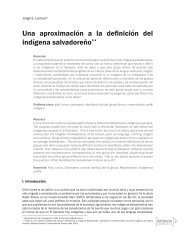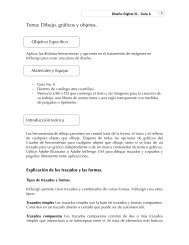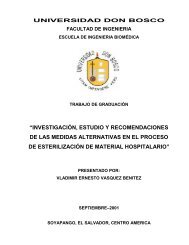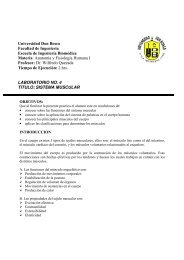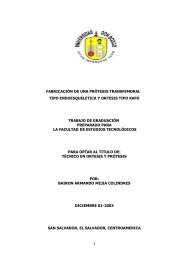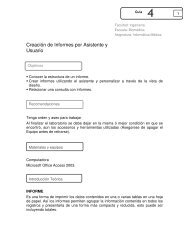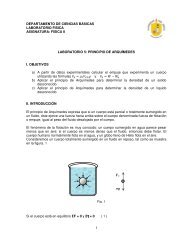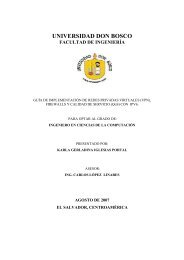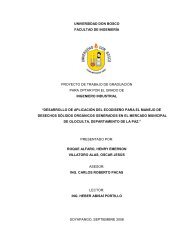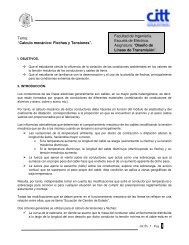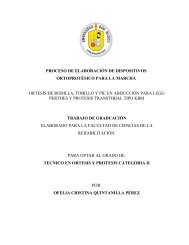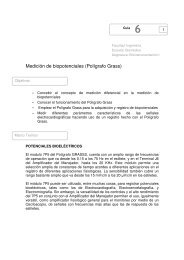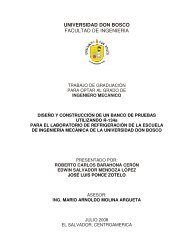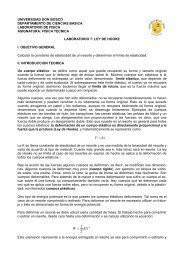cuentos de barro - DSpace Universidad Don Bosco
cuentos de barro - DSpace Universidad Don Bosco
cuentos de barro - DSpace Universidad Don Bosco
You also want an ePaper? Increase the reach of your titles
YUMPU automatically turns print PDFs into web optimized ePapers that Google loves.
<strong>Don</strong> Tacho era bajito, carnudo; dulce,<br />
moreno y calvo. Andaba siem pre en<br />
camisa, con la correya angosta bien<br />
ceñida bajo el ombligo. Su calva relucía<br />
como una berenjena; era una berenjena<br />
<strong>de</strong> treinta colones mensuales,<br />
impagables.<br />
Vecina vivía la niña Meches, hija <strong>de</strong>l<br />
agente <strong>de</strong>l “Diario”. Como el tapial302 era bajito, ella se subía en unos adobes;<br />
y, <strong>de</strong> codos sobre el pretil303 , miraba<br />
sonriente a don Tacho. Esta vez no<br />
tardó.<br />
—¿Cómo van sus jlores?...<br />
—¡Ah, niña Meches..., no dan; no dan,<br />
no sé qué pasa!... Quizá el zompopo304 ,<br />
o quizá lagua es mala, o la tierra; todo<br />
se va en vicio y no flo rea. Mire ésta, mire<br />
aquí: están todos mero chipes...<br />
—Abónelos con kakevaca.<br />
155<br />
Señor Tacho was short and fleshy;<br />
kind, dark and bald. He was always<br />
wearing a t-shirt, with the thin belt<br />
tightened un<strong>de</strong>r his bellybutton. His<br />
bald head was shiny like an eggplant.<br />
It was an expensive eggplant, worth 30<br />
colones 301 a month, more than anyone<br />
could afford.<br />
Miss Merce<strong>de</strong>s, the newspaper agent’s<br />
daughter, was his neighbor. Since the<br />
adobe wall was not tall, she was able<br />
to step on some bricks and, putting her<br />
elbows on the parapet, looked at Señor<br />
Tacho who was smiling. This time she<br />
came right to the point.<br />
“How are your flowers?”<br />
“Oh, Miss Merce<strong>de</strong>s... they don’t prosper<br />
at all. I don’t know what’s going on!<br />
Maybe the big leafcutter ants or maybe<br />
the water is bad, or the soil. It’s all for<br />
nothing and there are no flowers. Look<br />
at this, look here: they are all weak and<br />
sick…<br />
—¡Si los abono! Todo el barrido <strong>de</strong> “You should get some manure.”<br />
la mula se los echo: ya usté ve cómo<br />
“I do that! I use all of the mule’s manure.<br />
los cuido todas las tar<strong>de</strong>s y por las<br />
You know how I care for this gar<strong>de</strong>n,<br />
mañanas. Tengo mala mano...<br />
morning and afternoon. I just don’t<br />
have a green thumb…<br />
301. 30 Colones back in the 1930’s was an unpayable amount for a peasant who earned ¼ of a Colón<br />
per day.<br />
302. Muro <strong>de</strong> ladrillos <strong>de</strong> adobe.<br />
303. RAE: pretil. (Por *petril, <strong>de</strong>l lat. *pectorīle, <strong>de</strong> pectus, -ŏris, pecho). 1. m. Murete o vallado <strong>de</strong> piedra u<br />
otra materia que se pone en los puentes y en otros lugares para preservar <strong>de</strong> caídas.<br />
304. RAE: zompopo. (Del maya zonm, hormiga, y popo, gran<strong>de</strong>). 1. m. Am. Cen. Nombre genérico <strong>de</strong><br />
varias especies <strong>de</strong> hormiga <strong>de</strong> color café o rojizo, que tienen dos nódulos o ensanchamientos y tres o<br />
cuatro pares <strong>de</strong> espinas en el dorso <strong>de</strong>l tórax. Solamente la reina y los zánganos tienen alas. Viven en<br />
el suelo en colonias <strong>de</strong> miles y hasta millones <strong>de</strong> individuos, en hormigueros con varias entradas en<br />
forma <strong>de</strong> volcán y un laberinto <strong>de</strong> túneles que llegan hasta las cámaras. Se alimentan <strong>de</strong>l follaje <strong>de</strong> varias<br />
plantas.



